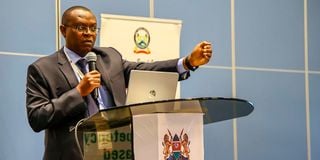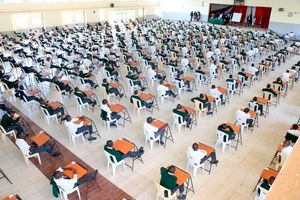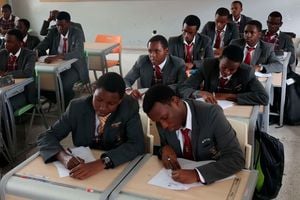
Kenya National Examination Council CEO David Njegere.
For the next three years, anyone who is dissatisfied with their performance or registered but failed to sit the Kenya Certificate of Secondary Education (KCSE) examinations has a chance to better his or her grade before the national test is discontinued from the education system.
Fresh details have emerged, after the initial announcement made during the release of the 2024 KCSE results, showing who is eligible for the new mid-year national examination and how it will work.
The CEO of the Kenya National Examinations Council (Knec) David Njeng’ere told Sunday Nation that the mid-year examinations will begin in July 2025 and the results are expected in August. This will also give a chance to 2024 candidates who wish to better their grades to make another attempt and be eligible for tertiary education intake in September 2025, alongside their counterparts who have already qualified.
“Anyone can register for the mid-year examinations. We will issue a circular next week and also a time-table for the examinations. The only students we’re going to block are those currently in school. Even if you sat for KCSE (examinations) 10 years ago, you can do the mid-year exam in July. This is because the KCSE examinations will come to an end in three years and we don’t want to overload the process in the last year,” said Dr Njeng’ere.
National examinations
The new national examinations will, therefore, offer another chance to those seeking to repeat the exams or candidates who registered but were absent for one reason or another.
The last KCSE examination under the 8-4-4 education system will be administered in 2027. The Knec boss urged the public, especially those wishing to retake the exam fully or partially, to take advantage of the remaining opportunities to do so before the system transitions to the competency-based assessment.
“I wish to remind everyone that the last KCSE examination will be administered in 2027. Any person wishing to repeat fully or partially should take advantage of the remaining chances to do so,” he said.
He explained that the mid-year examinations will be administered at the various county headquarters and that Knec had experimented it in 2024 when all the private candidates sat their examinations at designated venues in county headquarters. According to Dr Njeng’ere, Knec will use teachers to supervise administration of the mid-year examinations. The regular examiners will be assigned to mark.
“We’ll use the same examiners. We’re advising the Ministry of Education to work with the Kenya Universities and Colleges Central Placement Service (Kuccps) so that the results are considered for placement, for those who wish to join university. It’s not a very big population,” Dr Njeng’ere said.
The announcement for the mid-year series of examinations was made by the Cabinet Secretary for Education Julius Ogamba when he released the 2024 KCSE results in Nairobi on Thursday, January 9.
“Starting this year, and following extensive stakeholder consultations, I wish to announce that Knec will introduce a mid-year series of the KCSE examination, to be administered in July every year. The examination will target candidates wishing to repeat the KCSE examination, and those who may have missed sitting an examination due to sickness or other unexpected hardships. Adult candidates may also consider registering for the July KCSE series examination,” said Mr Ogamba.
Dr Njeng’ere observed that the number of students qualifying for university admission had gone up from 22 per cent to 25 per cent and said that it showed a better return-on-investment in education. This has been attributed to the new grading system that was first used in 2023 where a candidate’s mean grade is computed by considering their performance in mathematics, the best performed language from English, Kiswahili or Kenya Sign Language and five other best performed subjects.
University entry
“In a country where there are no adverse effects like war, the norm is to qualify about 30 per cent of the candidates for university entry. Kenya is the only country in Africa where we spend about 30 per cent of our national budget on education; it’s not a social thing, it’s an investment because we rely on our human capital. We shouldn’t even be talking about 30 per cent but something higher,” Dr Njeng’ere told Nation Africa.
“When we give them grades that can’t contribute to the economy, it’s a waste of the investment. The grading system is one of the factors that was not giving us a normal distribution but there are other factors,” he added.
He observed that with the new grading system, some students might find challenges fitting into subject clusters set by universities for various academic programmes.
“This is where schools need to do more career guidance for students to pursue their preferred careers and advise them on subject choices. But it was still a factor even when all the subjects were considered for grading,” Dr Njeng’ere said.
Knec has also developed sample examination papers for the Kenya Junior School Education Assessment (KJSEA) that will be administered, for the first time, to Grade 9 learners before they transition to senior school next year. The sample papers can be downloaded for free on the Knec portal.
On the results of the Kenya Primary School Education Assessment (KPSEA) that was undertaken last year, the reports have been uploaded on individual schools’ portal. The Knec CEO said that a national symposium will be held later in the year to discuss how the learners performed.
“We’ll have it because it’s like a scorecard which has different factors that affect learning,” he said.












